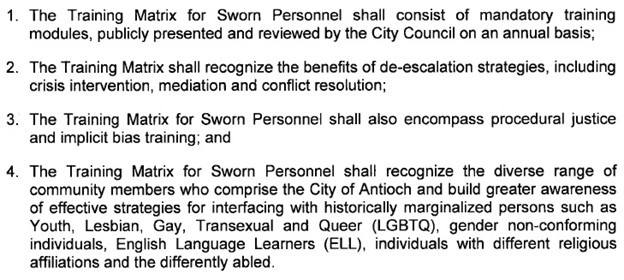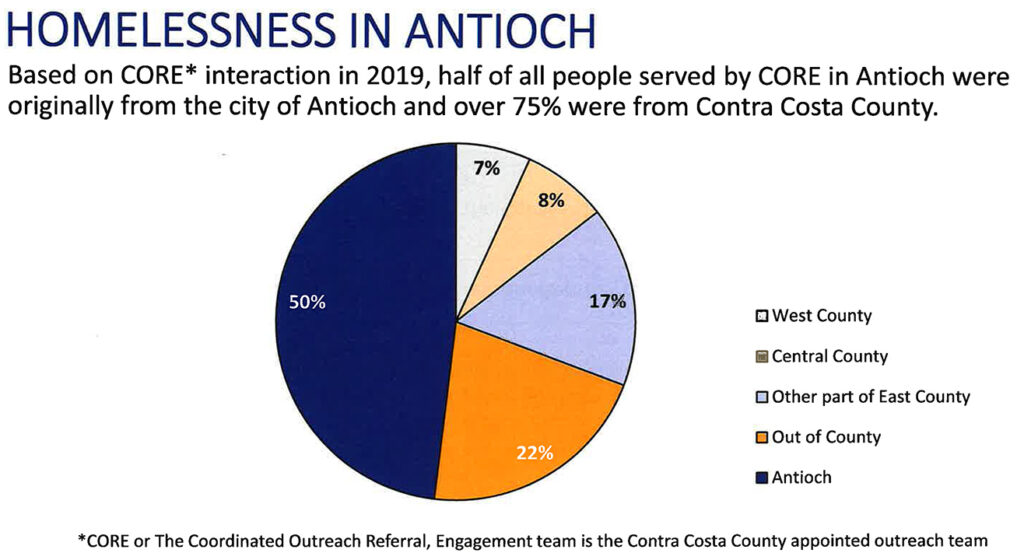
Figures add up to greater than 100%. Graphic from City of Antioch Update on Unhoused Strategies.
3 support 2 oppose before total costs are known; council will also consider Barbanica’s use of Pittsburg motel for Antioch homeless residents; motel not yet selected, only one responded to City’s RFP last year; another RFP will be sent out seeking program operator
Council wants to postpone sewer rate increases due to COVID-19, will decide during public hearing on June 8th
By Allen Payton
During their meeting Tuesday night, Feb. 23, the Antioch City Council split 3-2 on giving direction to city staff to develop a request for proposal on establishing a bridge housing program using a local motel. Councilmembers Mike Barbanica (District 2) and Ogorchock (District 3) opposed the effort. Barbanica instead wants the city to coordinate with the county in securing rooms at the former Motel 6 in Pittsburg to be used for homeless Antioch residents. Ogorchock was concerned about both the “astronomical costs” of the proposed program that will increase each year, and the lack of a total budget.
The council was not provided the total costs for the program because the proposal presented did not include the lease of a motel. Only one motel responded to the request for proposal (RFP) sent out by the city asking if any were interested, last year. Discussions with the owner were ended until the council made the decision to move forward with the bridge housing program and to determine what kind of program would be offered there.
Now, another request for proposal will be sent out seeking an organization that wants to operate the program and will provide what the real and total cost figures will be.
The result is the city still has yet to spend most of the funds from the $517,000 the council approved in November 2019 to help the homeless. Mayor Lamar Thorpe pointed that out and wanted to remind Jazmin Ridley, the city’s unhoused resident coordinator, that he wanted her to implement a motel voucher program amid other ideas, such as providing showers, using the remaining funds. However, Barbanica, said that City Manager Ron Bernal told him only $140,000 of those funds are remaining. Yet, in the city staff report no information was provided to the council of how much of those funds has been spent and on what. A request for a list of expenditures from those funds has been requested from Bernal.
Unhoused Strategies Report
The city’s new Unhoused Resident Coordinator, Jazmin Ridley presented the staff report on the Unhoused Strategies for the city. She shared the statistics on homeless residents in Antioch, that 75% are from within the county, including half from Antioch.
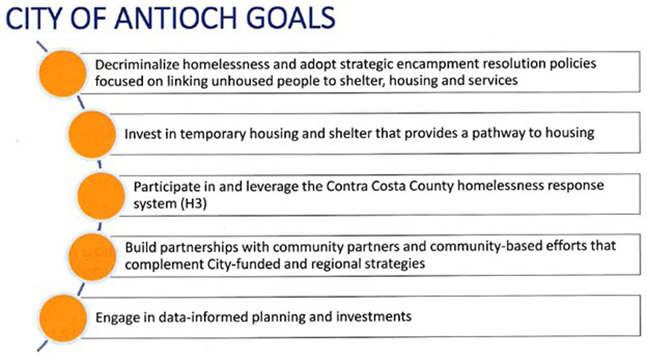
City of Antioch Goals on Homelessness
Ridley also shared about “the goals that we can meet” including:
- Decriminalize homelessness and develop strategic encampment resolution policies focused on linking unhoused people to shelter, housing and services.
- Invest in temporary housing and shelter that provides a pathway to housing.
- Participate and leverage the Contra Costa County homelessness response system (H3 – Health Housing & Homeless Services)
- Build partnerships with community partners and community-based efforts that complement City-funded and regional strategies
- Engage in data-informed planning and investments
The program would include 30 beds to serve the estimated 238 homeless residents in Antioch, with stays of up to four months.
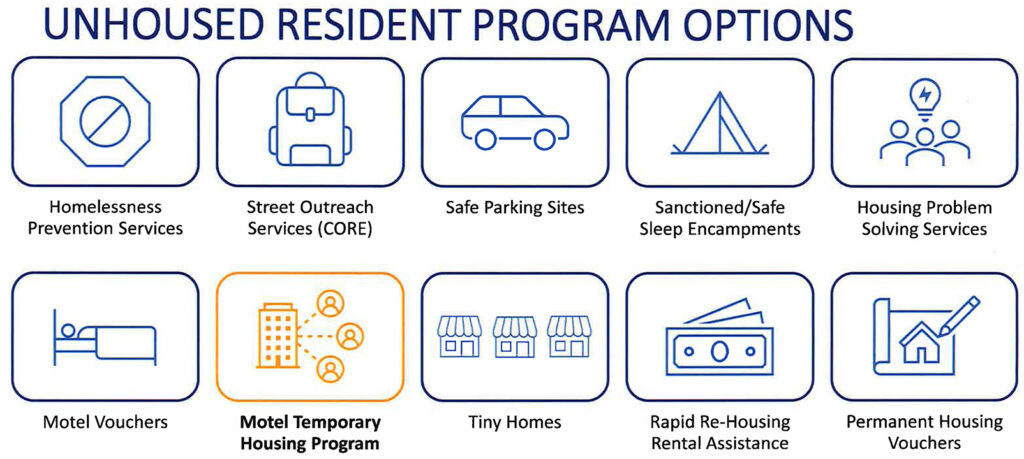
Program Options
Ridley also shared a list of options to assist homeless residents, which include: Homelessness Prevention Services; Street Outreach Services (CORE – the county’s Coordinated Outreach, Referral and Engagement team); Safe Parking Sites; Sanctioned/Safe Sleep Encampments; Housing Problem Solving Services; Motel Vouchers; Tiny Homes; Rapid Re-Housing Rental Assistance; Permanent Housing Vouchers and Motel Temporary Housing Program, which is the bridge housing approach the council directed staff to pursue.
Estimated Program Services Budgets (Without Motel Lease)
In the proposed annual Services Budgets for the three options for a bridge housing program, most of the money would be used to pay staff salaries and benefits of about $310,300 to $506,219 out of the total estimated $450,000 to $858,000. The remainder would be spent on operations. Only $18,000 to $45,000 would be spent on financial assistance for those in the program. Services Budgets for 3 Bridge Housing Program Options
Public Comments
“The amount of money that the city could potentially spend is outrageous,” wrote George Medeiros. “This way of thinking is why residents are wanting to move out of Antioch. This is not what I call Opportunity Lives Here.”
Michelle Lujan wrote that she supports the bridge housing program.
Nichole Gardner wrote about the help she and her team provided to one woman to stay in a motel, recently.
“This type of project could help so many people,” she said. “Because they too are seniors, are Black and brown and endure injustices by our police department, they too are veterans. It is up to you to be bold enough to do it.”
Lucille Meinhardt wrote, “I support any effort to help those on the streets.”
Joy Motts wrote in support of the effort.
“You have the choice before you tonight to do something about it,” she wrote. “You may say it’s too expensive. But the City of Antioch spent over $1 million moving homeless encampments, last year.”
Mina Guevara spoke on behalf of her father, George offering prepared remarks. (NOTE: Not all of the remarks fit within the three-minute limit. They are provided in their entirety below.)
“He asked me to speak on his behalf,” she said. “As life-long residents of Antioch, we are concerned with how the City of Antioch has dealt with the unhoused population.
Even listening to the speakers tonight, it is painfully frustrating. I respect the work that the consultants and Ms. Jazmin have mentioned. But this is not a new problem. The roots of this problem are not new. Yet, we are spending thousands of dollars on programs that have yet to culminate in anything besides adding more jobs to people in the city and our unhoused neighbors being overlooked and unwanted.
Today, we know the root of most homelessness – mental health needs, addiction, domestic violence, and often people who work jobs but do not earn enough to live in this increasingly expensive community. We know what people need. Why can’t we just stop “researching” and “proposing” and start providing?
My family runs a 501(C)3 dedicated to providing food to those in need. We work closely with the homeless in Antioch and East Contra Costa. As in, often six days a week we are visiting with the unhoused, using the act of breaking bread to build relationships and help find solutions and avenues for supporting these community members who need help.
The thing is, in the last nine months, as we feed people and connect daily – we have yet to see anyone from the City reaching out to help. Excuse me – I do want to give Councilwoman Orgorchalk credits as she has met with many unhoused neighbors with us many times and has worked to provide the help that we or the individuals were not able to obtain. For example, one unhoused member had been desperate calling for medical aid from CORE for months. It wasn’t until Councilwoman Ogorchalk made persistent calls and she get CORE to visit this man and provide him the medical aid he needed.
The unhoused are just as frustrated by the City of Antioch as we are.
How the city is spending our tax dollars is concerning. As someone who works compassionately and tirelessly with the homeless, I am concerned that thousands of dollars are available, but not available for the people who can benefit most.
I have asked city leadership and staff about where the money for the FEMA trailers has gone. I have asked about the job position of a homeless advisor. Porta-potties were given and then taken away – the same with water stations. CORE is inconsistent and offers a band-aid for a solution. And when I say band-aid, I literally mean band-aids. And now there is a new program on the agenda – but what faith should we have in you as city leadership to do what you saying you are going to do. The track record is not great.
Even listening to Mr. Curt, the amount of debris from homeless encampments is frustrating to listen to. He does acknowledge it is a complicated problem. But, just as recently as December, a camp was razed and there is more debris now than there was when people lived there. The dumping problem is easy to blame on the unhoused, but – I’ve seen people come in a make major debris dumps in the camp. I’ve seen stolen cars stripped. It’s easy to blame the unhoused – but that is a resident issue – irresponsible residents not wanting to pay for legal dumping.
Ms. Ridley even just stated that data leads to the solution. So, what I get from that is that thousands of dollars have been invested into this problem and there have been no solutions. And solutions will be layers. But what data can you show me that supports the actions that have been taken in correlation to the money that has been provided for the city. Transparency to showcase data-led solutions would be welcomed by the community.
It seems like there are problems. We all see them. We see there is money to be provided for the issues around the unhoused. But all we see is money being used in non-transparent ways and the problem being pushed from one side of the city to another.
I question how this new program is going to benefit the actual unhoused population in Antioch? How this money is being spent should be clearly communicated to the public. How can we trust that you are going to do what you say you are going to do?”
“Antioch residents, housed and unhoused, deserve better leadership and better solutions than this,” Guevara concluded.
Council Discussion & Decision
“We need wrap-around services there…to get to some type of permanent housing,” Mayor Pro Tem Monica Wilson said.
“If you’ll look at the back of the services budget, you’ll see you will have a couple case manager and a couple service managers,” said Kate Bristol of Focus Strategies, the city’s consultant on homeless issues. “The county has a robust variety of services but they’re hard to access. You’re going to have a whole array of different pathways for people to get out back into housing. There’s no one-size fits all.”
“The service providers might be on sight all the time or during the week,” Wilson said.
“The case managers will be there during regular hours,” Bristol said. “But you will want to have someone there all the time. The intensive services will be there during regular working hours.”
Torres-Walker “I get the frustration from the last speaker and it definitely felt heartfelt and my heart is open. As someone who spent their young adult years homeless and sleeping in parks…then moving on to home ownership I can understand how difficult it is to get all the streets.”
“Tonight, we’re not voting on a hotel or a hotel for trailers but a budget and recommendation for services,” she said.
“No. What we will do is be asking staff to put out an RFP (request for proposal)…and giving staff direction to look for great opportunities, like the state’s Homekey program,” Thorpe responded. “We would be asking for the bridge housing request for proposals. We’ve already done the request for proposals for the hotel. We received one. But the negotiations stopped because we didn’t know what kind of services we’ll be providing.”
“I just want to be clear about that,” Torres-Walker continued. “I did talk to Mr. Bernal about the whole motel model and it’s my understanding that’s on hold for several months. Because the Executive Inn is in my district and right up the street from my home. Living here, as well has not been a walk in the park and there’s a lot of work in the community around this motel…that raise a lot of concerns for me.”
She asked that the council “consider as we are spending time to get this set up that we spend time and resources in making the community safe.”
“All of the hotels are in District 1,” Ogorchock said. “So, if this program goes forward it will be in District 1.”
“Do you have the costs for the lease on the motel because it’s not in here,” she said.
“We’re talking about the bridge housing concept,” Thorpe said.
“But that would be part of the cost,” Ogorchock said. “So, even if you’re looking at the bridge housing and motel setting those aren’t the total costs.”
“The final costs will come once we have a service provider,” Thorpe said. “We will send out an RFP and agencies will respond to it and give us the final numbers. We’re not budgeting anything…because there has been no proposal that has the services and hotel.”
Ogorchock pressed again about the total costs.
“These aren’t real numbers. These are rough numbers that Kate Bristol and her agency put together to say this is what they could look like,” Thorpe responded. “We will be able to show what the costs will be once the request for proposal comes back. These are just concepts.”
“What model of best practices have you seen on this kind of project?” Ogorchock asked.
“On bridge housing…is it still the best practice over a community shelter?” Bristol asked. “If you identify the right providers who know what they are doing they will bring their best practices. They are embedded in the way the services are delivered.”
“Can you share the benefits versus the cost on a proven model…another city or someone else that’s doing this?” Ogorchock asked. “One that is city-funded.”
“I don’t have an example of a city of your size. There are some that larger cities have invested in. I can get you their costs and the results,” Bristol responded.
“Are you talking about the San Francisco one? Because it failed, I believe,” Ogorchock said.
“I’m not sure which one you’re talking about. They have several,” Bristol stated. “They started one on Mission Street then started replicating around the city…but that was before COVID. But they’ve been kind of shifting to motels. But the direction in the field in California around best practices is to move to these, somewhat more service enriched shelter approach, that when you leave you exit to housing.”
“Where would they go after four months? Would they just go back to the streets? Ogorchock asked.
“No. That wouldn’t be the goal. You can set a target for a length of stay. You can start with 120 days. That would be an average. Some would stay fewer months, some would stay longer,” Bristol responded. “They could get bridge funding from the county or find another pathway to get to housing. That’s really the job of the folks doing the case management.”
“It’s a difficult topic, trying to find the right fit for the city,” Ogorchock said. “What are the costs versus benefits? What are we looking at? What are the expected outcomes?”
“I would say that the goal of this is to reduce the unhoused population as much as possible within the community,” Barbanica responded. “But my belief…is that we can’t do nothing. Not only is there a human cost, here. But there’s also a cost to the community. The costs you’re seeing here the city is already experiencing.”
“But those costs aren’t going away. You’re talking about 28 individuals going into a hotel,” Ogorchock responded.
“I’m not saying I’m for this program, here. But the time for doing nothing is over,” Barbanica stated. “We have an opportunity…to do something…whether we’re doing all of this or none of this. I don’t want to say the city has done nothing, but there are individuals staying in those hotels, right now. If you don’t find housing for them, you’re going to put them back on the street (at the end of four months).”
“The costs are astronomical,” Ogorchock said. “It’s not going to stop the dumping or the feces or the urine in the river. But if you don’t have the services for them, the mental, drugs and alcohol. If we’re not going to oversee what they’re doing in the room then what are we changing? Instead of giving a helping hand we want to help them out of their situation.”
“We probably should have prefaced this…cities have a choice. We can either continue spending resources…reacting to the situation. That’s solved absolutely nothing. All we have done is accommodate people on the streets,” Thorpe said. “Or we can help house people…so we can stabilize people’s lives so they can get the services.”
“We’ve been paying millions of dollars chasing people from corner to corner,” he continued. “This is bridge housing…Fresno just opened their fourth hotel to adopt this concept to move folks forward into permanent housing. Breaking news, there are no services in East Contra Costa County. Literally we have a CORE Team that we share with all the other cities as an entry point for services that don’t exist in our community.”
“We can stay reactive and waste taxpayer money or we can come up with solutions and provide interim, bridge housing then get them into permanent housing,” Thorpe added.
“We are looking at spending a lot of money. Something needs to occur here, for the community for those who are unhoused,” Barbanica said. “In 2019…over $500,000 has been earmarked to go to the unhoused. We used part of that money to hire the unhoused resident coordinator. There’s at least $140,000 to be spent on temporary housing and literally none of that has been used.”
He spoke of his tour of the former Motel 6 in Pittsburg. It has 176 rooms. “30% of the residents there are from Antioch. It’s a 90- to 120-day program. Again, wrap around services. There’s a doctor on-site. Within 10 days they meet someone to get into permanent housing…either to reunite with family or get them into a program.”
“The county has just received 100 Section 8vouchers…and $3 million for permament housing,” Barbanica continued. “I’ve asked Jazmin to use that $140,000 to help get people off the street.”
“I spoke to (Pittsburg Police) Chief Addington. Calls (for police service) at the hotel, itself have decreased over time. The calls to the surrounding commercial areas have increased,” he pointed out. “They are actually now paying two officers…because of the calls for service in those shopping centers. I’m asking for a hybrid of this.”
“I’ve spoken to Lavonna Martin of the county and she said the cost for this type of program would be about $2.5 million,” Barbanica stated. He then suggested using the $140,000 to pay for rooms for Antioch residents at the motel in Pittsburg.
“It won’t house everybody, but neither solution will house everybody,” he continued. “There’s not enough people in CORE. We need to partner with the county to get some people assigned to Antioch. Let’s not reinvent the wheel.”
“One thing I want to know, Homekey is being 100% paid for by the state,” Ogorchock said. “First responder calls have increased…at that motel. Doing a hotel ourselves is going to be a cost that we’re going to have year after year. These increase year after year, right?”
“You’re going to have to factor in costs going up,” Bristol responded. “You’re going to have that at the Motel 6.”
“But that’s paid for by the county,” Ogorchock said.
“If you get the county to dedicate a certain amount of rooms at that motel, then you can get started sooner,” Bristol responded.
“I know that we are not talking about a motel, tonight. If we were I would be in full support of it, but we are not. It would only be viable in District 1,” Councilwoman Torres-Walker said. “A community that you neglect and overlooked for years and don’t invest in and provide quality police services…I’m not saying this isn’t something that anybody will support. But we should be served as residents, as well. Quality of life is important…you can’t keep asking people to be burdened and give and give and give and not get something in return.”
Wilson said, “We do also need to think about the surrounding community. The Motel 6 idea I would like to hear more about. I know that with the county program that is set up there, most the residents there are either COVID-positive or high-risk for COVID. Is there going to be a way to keep people safe and keep people healthy. If we have a healthy, COVID-free unhoused resident, we don’t want to have them mix in that environment. But I want to hear more about Motel 6.”
“We need to give direction on bridge housing…do we want to move forward on that?” Thorpe asked. “I see Torres-Walker nodding her head.”
Barbanica said “no” as did Ogorchock.
“I see we have a majority to move forward on the bridge housing,” Thorpe said.
“We asked if there was any outreach to the residents around that hotel,” Ogorchock then said.
“We can still do that,” Thorpe said. “We had two community conversations, Mike and I. There seems to be good feedback. Other folks say it should focus on emergency housing, quick and fast. We’ve talked with Rocketship (Delta Prep K-8 school nearby).”
“We are to pursue an RFP on a bridge housing type model and look for grant funding opportunities,” City Manager Ron Bernal said.
“The Motel 6 concept I will bring back to council. If we can do both…let’s get all the information and do a determination,” Thorpe then said. “I know there’s frustration around the lack of spending $500,000. We haven’t wasted the money because we haven’t spent the money. I really want Jazmin to get going on the motel vouchers.”
“I know all council members have been out there. We all get calls. It tears our hearts out to see fellow human beings living in the conditions they are,” he said. “I know every staff member, every council member is committed to this issue to get people on the right path and get them into permanent housing. I want to applaud my fellow colleagues. I also want to applaud the advocates out there for holding the fire to our feet.”
Council Opposes Sewer Rate Increase, But Will Still Hold Public Hearing Process
In other council action, the members unanimously agreed that they want to postpone increases in sewer rates. But the Prop. 218 mailed notification of a potential rate increase and public hearing will still be done.
“It doesn’t mean we have to do the rate increase,” Ogorchock said.
If council postpones the rate increase, city staff said that will mean a greater rate increase next year, rather than smaller rate increases for both years.
“Is it possible CARES money or whatever it’s going to be called, that it can be used to help individuals?” Ogorchock asked. “Or is that a gift of public funds?”
“I believe that will be a question for counsel…because we have a lot of leeway in the use of the (federal) relief funds,” Thorpe pointed out. “That will be a separate agenda item. We need to have staff do what they’re going to do. But when it comes back we don’t have to raise the rates.”
“We are not voting to increase rates. We are just voting to examine this issue,” he said. “After we do the Prop. 218 and have our public hearings, then we will decide if we’re going to raise rates. We are in the middle of a global pandemic and the last thing we want to do is raise rates.”
The public hearing date is set for June 8th.
The council still approved the process for the notification and public hearing, but on a 4-1 vote with Barbanica voting against.
The council then took a break before listening to 215 written public comments, according to the mayor. Plus, 10 people in the audience would speak live, according to City Clerk Ellie Householder.
But Ogorchock asked to suspend the rules to finish the consent calendar, first. The council agreed and approved all the items on the consent calendar.
Thorpe then reduced the time for each public comment from three-minutes to one. Click here to watch the entire council meeting, and listen to all the public comments at the end of the meeting.












 On Tuesday, June 8, 2021, at about 11:41 am, Antioch Police Department patrol officers were dispatched to the field area behind
On Tuesday, June 8, 2021, at about 11:41 am, Antioch Police Department patrol officers were dispatched to the field area behind 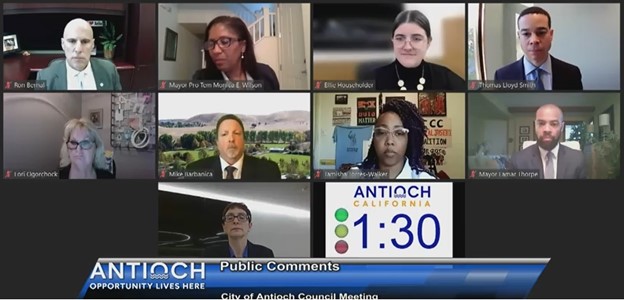
 By Allen Payton
By Allen Payton